'There will be greater communalisation. He talks about development, but his people tell his critics to go to Pakistan and brand Muslims as 'butchers'. This is the true colour of the BJP.'
'He deliberately does not stop them because that is his real agenda; he wants to make sure that the Hindu votes come to the BJP,' says senior journalist Kalpana Sharma. Ritu Jha/Rediff.com listens in.
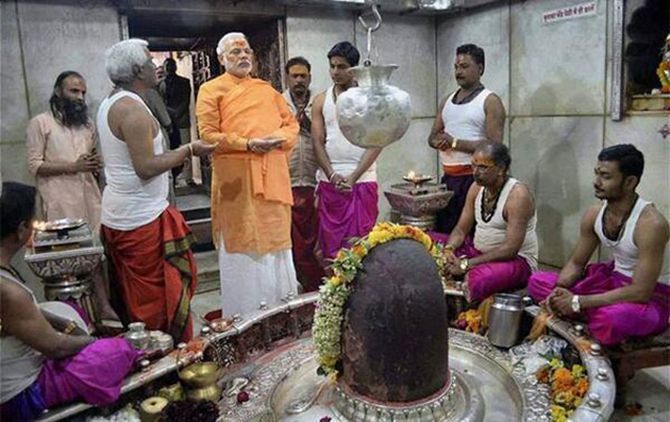 More than two dozen academicians gathered at the Centre for South Asia at Stanford University, California, to listen to a lecture on the elections in India on April 21.
More than two dozen academicians gathered at the Centre for South Asia at Stanford University, California, to listen to a lecture on the elections in India on April 21.
The speaker, Kalpana Sharma, is a senior journalist, a columnist with The Hindu, and visiting faculty at the Graduate School of Journalism at UC Berkeley.
Her topic -- Elections 2014: The day of the argumentative Indian -- focused on the Indian media, the users of social media, the Bharatiya Janata Party's prime ministerial candidate Narendra Modi, and the debut of the Aam Aadmi Party in these elections.
On the AAP
The AAP will get four to five seats, but that is tremendous. Young India wants politics with a difference and that is why they are turning to this new party. It's still a noble party, and has taken a leap of faith by putting up 400 candidates across India, even though they have no organisational skills to be able to deal with Parliament.
It is one thing to win in Delhi, but to win at a national level is a different ball game.
But they have made their presence felt and now nobody can ignore them in future elections. The AAP now has a national presence.
On Modi and the BJP
I believe these elections have the same feel as the 1977 elections, where people were enthusiastic and wanted to make a difference. The difference this time may be that people will vote for Modi because they are fed up with the Congress.
People want to see a change because the BJP has been rolling propaganda that the Congress has been indecisive and corrupt. There is an anti-incumbency feeling and the BJP will benefit from that.
I will be very depressed if Modi becomes prime minister. There will be greater communalisation. He talks about development, but his people tell his critics to go to Pakistan and brand Muslims as 'butchers'. This is the true colour of the BJP.
He deliberately does not stop them because that is his real agenda; he wants to make sure that the Hindu votes come to the BJP. They are not interested in the Muslim vote. This is the real face of Modi.
Not all of Gujarat is thriving; places near the Ahmedabad border have no development, there is no water, electricity is erratic -- how can you talk about development?
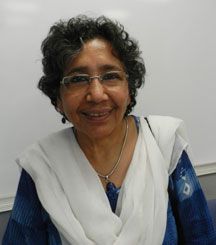 You leave out a whole lot of people. What model of development is this? He (Modi) wants you to forget about the poor. I don't think India deserves a prime minister like that.
You leave out a whole lot of people. What model of development is this? He (Modi) wants you to forget about the poor. I don't think India deserves a prime minister like that.
On the election trend
With more than 408 current affairs and news channels, the electronic media is big in India. This has never happened earlier. This elections are different now because there weren't 850 million voters earlier and there was not this much media presence, neither was there such a large number of urban middle-class voters.
Earlier, elections never had non-political candidates, but this time the AAP has changed that.
About the urban middle-class
Pointing to a survey by Google which says that 160 to 170 constituencies are being influenced by social media, Sharma says, "I think the figure is inflated and far from being realistic. It is possible that these constituencies have a substantial number of people who access the social media, but the majority of this number would be those who may not be even of a voting age."
"Secondly, they may be using social media for reasons not necessarily political, and they will not add up to an important enough number -- many just talk, but do not go to vote," she adds.
"The urban middle-class has a greater impact on this election than in previous elections," she feels.
"One-third of India's population is urban and most of them have access to a television. Modi has energised the urban middle-class through this medium; that somehow he is the saviour who will change India and will bring about development and nine per cent GDP growth," says Sharma.
"Modi's public relations team has been very good at selling the so-called 'Gujarat Model'. They talk about business and industry and a strong leader, and people buy that."
Images: Top: Narendra Modi offers prayers at the Kashi Vishwanath temple in Varanasi. Photograph: Courtesy: Narendra Modi's Web site. Below: Kalpana Sharma.





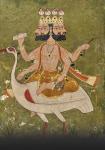


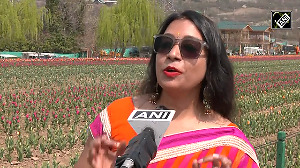
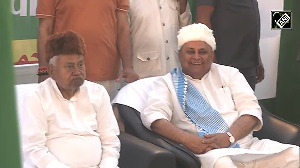

 © 2025
© 2025